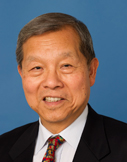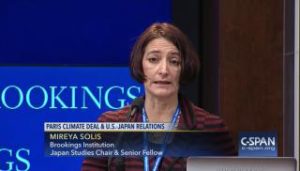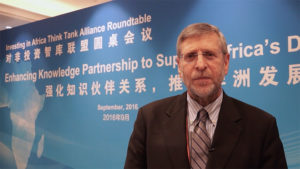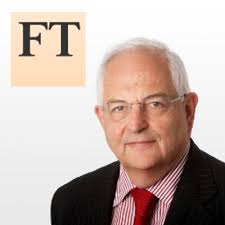With President Trump scheduled to meet President Xi Jinping and other China leaders Wednesday in Beijing, it is hard to know how much their discussions will focus on U.S.-China trade and economic policies. U.S. concerns about North Korea’s nuclear weapons program and China’s military expansion in the South China Sea could dominate.
Whatever the outcome, modern ties between the world’s two largest economies are crucial for the global economy — and often misunderstood. Here is what top experts and analysts are saying about China’s beliefs about trade and economic policy today, and what’s at stake for the U.S. and the world.
On China’s view.
Financial Times
“Mr. Xi believes the west is declining as China rises and it is time to redouble efforts to boost Chinese influence around the world.”
Anja Manuel, author, and co-founder and partner in RiceHadleyGates LLC. She was responsible for South Asia policy in the second George W. Bush administration.
 “Most Chinese believe that their economic model provides a great alternative to western democracy – (that) it is more efficient than any other system at rapidly raising people out of poverty.”
“Most Chinese believe that their economic model provides a great alternative to western democracy – (that) it is more efficient than any other system at rapidly raising people out of poverty.”
“The Chinese Communist Party is trying something completely novel: opening up its economy while keeping an ever-tighter grip on politics.”
Yukon Huang, author and senior fellow at Carnegie Endowment for International Peace, specializing on China’s economy and its regional and global impact. He is a former World Bank country director for China and Russia, and former U.S. Treasury official.
 “Conventional wisdom says corruption impedes growth because it dampens investment incentives. But China is different. The state controls all the major resources but rates of return are much lower for state-operated assets than for the private sector.”
“Conventional wisdom says corruption impedes growth because it dampens investment incentives. But China is different. The state controls all the major resources but rates of return are much lower for state-operated assets than for the private sector.”
“Corruption has been the means informally to transfer the use rights of resources from state to private sector since privatization of ownership is not politically acceptable.”
On China’s global trade strategy.
Anja Manuel, RiceHadleyGates LLC
“Unlike in India and the United States, China uses aid, trade, and foreign direct investment strategically to build goodwill, expand its political sway, and secure the natural resources it needs to grow. All are part of one, mostly coherent, national industrial policy.”
The Economist
“…(H)undreds of billions of dollars are to be invested abroad in railways, ports, power stations and other infrastructure that will help vast swathes of the world to prosper. That is the kind of leadership America has not shown since the post-war days of the Marshall Plan in western Europe (which was considerably smaller).”
Mireya Solís, co-director of Japan foreign policy studies; David Dollar, senior fellow and expert on China’s economy; and Jonathan Stromseth, senior fellow and specialist on East Asia policy, Brookings Institution



“China is lending about $60 billion per year for infrastructure in developing countries, far beyond what the World Bank and ADB (Asia Development Bank) are doing. OBOR (One Belt, One Road) is the brand, but the effort in fact is global with much of the lending going to Africa.”
Yukon Huang, Carnegie Endowment for International Peace
“Despite the U.S. and China being the world’s two largest economies, only about one or two percent of U.S. foreign direct investment has gone to China over the past decade…(O)nly three or four percent of China’s outward investment has been directed to America.”
“(T)he EU is a much easier market for China to penetrate because it offers a greater choice of partners…If one EU country restricts access to its market, a Chinese company can still enter through a different member country to gain access to the greater EU market.”
On China and the West.
Anja Manuel, RiceHadleyGates
“The West seems to be in a defensive crouch. Yet it is impossible to turn back the clock: China and India … will continue to rise to great power status, no matter what we do.”
“By 2030, 40 percent of the world’s middle class will be living in these two countries alone—compared to only about 20 percent in the United States and Europe combined.”
Mireya Solís, David Dollar, and Jonathan Stromseth, Brookings Institution
“Even many democratic and well-managed countries are turning to China for finance because the existing developments banks lack sufficient resources and are mired in regulation and bureaucracy.”
The Economist
“Mr. Xi’s words are heeded partly because he has the world’s largest stockpile of foreign currency to back them up.”
Martin Wolf, chief economics commentator, Financial Times
 “Will this combination of Leninist politics with market economics go on working as China develops?
“Will this combination of Leninist politics with market economics go on working as China develops?
“The answer must be: we do not know.”
The Economist
“The world does not want an isolationist United States or a dictatorship in China. Alas, it may get both.”
** **
To learn more, we encourage you to check out these books and articles, the sources for one or more of the above excerpts.
China’s view:
Anja Manuel, This Brave New World: India, China and the United States. Simon & Schuster. New York. 2016. Conclusion, p. 275.
Yukon Huang, “Xi’s chosen path to transformative leader,” Financial Times. October 25, 2017.
Financial Times, editorial. “China tilts back towards a cult of personality.” October 25, 2017
China’s global trade strategy:
Anja Manuel, This Brave New World: India, China and the United States. Chapter 10: “The New Mercantilists,” p. 218.
The Economist, cover story: “The world’s most powerful man.” October 14, 2017.
Mireya Solis, David Dollar and Jonathan Stromseth, “Rescuing U.S. economic strategy in Asia.” Brookings Institution, October 25, 2017.
Yukon Huang, “What the West Gets Wrong About China’s Economy: Debt, Trade and Corruption,” Foreign Affairs, September 14, 2017; and,
Yukon Huang, Cracking the China Conundrum: Why Conventional Economic Wisdom is Wrong. Oxford University Press. 2017.
China and the West:
Anja Manuel. This Brave New World: India, China and the United States. Simon & Schuster Paperbacks. New York. 2017. Preface.
Mireya Solis, David Dollar and Jonathan Stromseth, “Rescuing U.S. economic strategy in Asia.” Brookings Institution, October 25, 2017.
Martin Wolf, “The Challenge of Xi Jinping’s Leninist autocracy.” Financial Times. November 1, 2017.
The Economist, cover story: “The world’s most powerful man.” October 14, 2017.

Leave a Reply